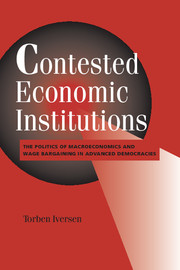Summary
How do macroeconomic policies and economic institutions jointly determine economic performance and distribution? This is a classic topic in comparative political economy, and one that preoccupies politicians at a time when high unemployment and rising inequality are tearing apart the social fabric of many societies. Yet it is a topic that has drifted into the background in the scholarly literature as a result of the rational expectations revolution in economics. According to the new orthodoxy, macroeconomic policies in general, and monetary policies in particular, have no long-term effects on the real economy. Consequently, the analysis of macroeconomic policies and institutions has been reduced to a focus on either their short-term effects (e.g., Alesina, Roubini, and Cohen 1997) or their consequences for nominal variables such as inflation (e.g., Cukierman 1992). This book instead argues that even under rational expectations, macroeconomic policies and institutions have long-term effects on unemployment and distribution of income. Hence, it seeks to reunite classic comparative political economy with modern macroeconomic theory.
There are weighty empirical and political reasons for undertaking such a project now. In most advanced industrialized countries the problems of unemployment and inequality are as pressing today as they were in the 1970s. Yet neither traditional comparative political economy nor new classical economics offers credible explanations for these problems, much less proposes credible solutions. For example, in a recent study by the OECD, the neo-corporatist idea that unemployment is determined by the organization of wage bargaining receives no empirical support (OECD 1997a). At the same time, the neoclassical notion that unemployment is caused by labor market rigidities can account for at most a small portion of the variance in employment performance (Nickell 1997). And while rational expectations macroeconomics offers a powerful critique of traditional Keynesian analyses, the theory has next to nothing to say about what governments can do to influence employment and income (Mankiw 1990).
This state of affairs is beginning to change. New classical economists are increasingly concerned with understanding the mechanisms by which macroeconomic policies and institutions affect, not only people's inflation expectations, but also their real behavior.
- Type
- Chapter
- Information
- Contested Economic Institutions , pp. 1 - 14Publisher: Cambridge University PressPrint publication year: 1999



